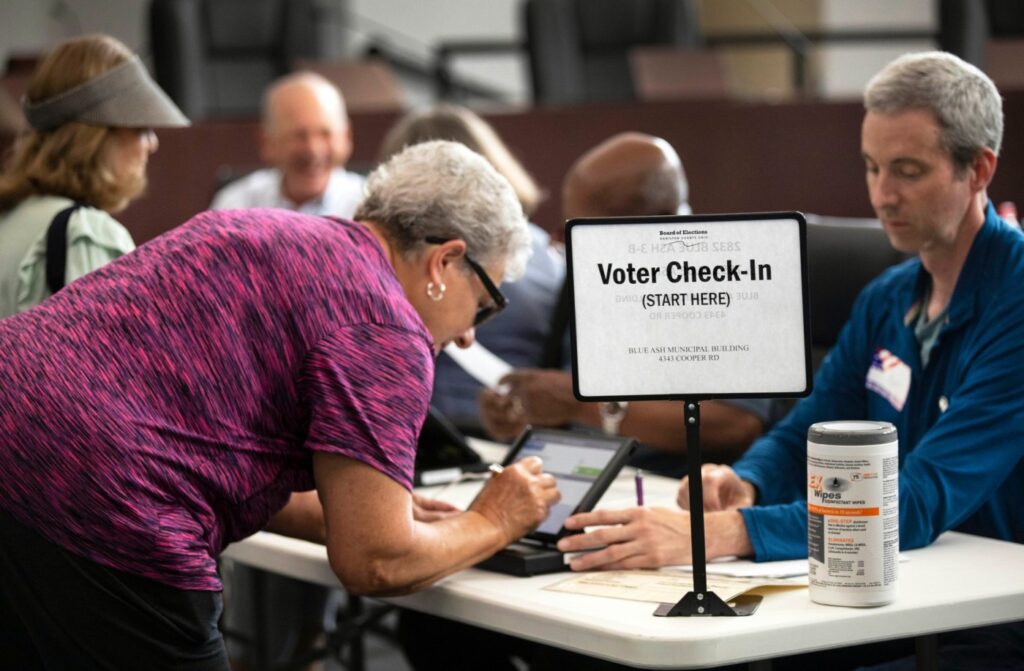
A South Florida federal judge quickly dismissed a lawsuit against Donald Trump that sought to have the former president declared ineligible for another term as president.
U.S. District Judge Robin L. Rosenberg ruled that plaintiff Lawrence Caplan, and two other plaintiffs he added to his original lawsuit against Trump, lacked the legal standing to bring the case.
“Plaintiffs in this case similarly lack standing and, thus, this court lacks jurisdiction. Accordingly, the court exercises its discretion under the Declaratory Judgment Act, along with its obligation to examine its own jurisdiction, to dismiss this case,” she wrote in an order signed Thursday in West Palm Beach — exactly one week after Caplan filed his case.
Caplan said Friday he had “only looked at her opinion very quickly,” and he needed to examine it more closely.
“As far as her dismissal, I’m not surprised at all because I always thought that standing would be the preeminent issue,” Caplan said.
He said he did not plan to appeal Rosenberg’s dismissal “because that’s not going to go anywhere.” But he said he did not know if there are other options for filing another case in another jurisdiction.
Caplan’s lawsuit argued that the 14th Amendment to the Constitution — added after the Civil War to prevent people who had engaged in insurrection against the U.S. from holding office again — applied to Trump because of his involvement in and around the Jan. 6, 2021, attempt to overturn the results of the 2022 election.
In her ruling, Rosenberg referred to Trump’s “alleged” involvement. Rosenberg was nominated for the bench by then-President Barack Obama.
Much of the ruling quoted legal precedents giving the court discretion in deciding whether to allow a case to proceed and detailing the requirements for a plaintiff to have legal standing to bring a case. She said plaintiffs must have a personal stake in an issue that is particular to them.
The left-leaning national organization Free Speech For People, which like Caplan and prominent conservative and liberal scholars, argues Trump is disqualified under the 14th Amendment. In a statement Friday, the organization said Rosenberg’s ruling that the court doesn’t have jurisdiction and an individual doesn’t have standing is “unsurprising.”
Free Speech For People said it plans to challenge Trump’s eligibility in “multiple states” using existing challenge procedures. “This ruling, based on the limited jurisdiction of the federal courts, has no impact whatsoever on Trump’s eligibility for office or Free Speech For People’s planned challenges under state candidate eligibility challenge processes that are designed for this purpose.”
On Wednesday, the organization sent letters to chief election officials in five states — including Secretary of State Cord Byrd in Florida — urging them to keep Trump off the ballot under the provisions of the 14th Amendment.
Rosenberg wrote that the plaintiffs “lack standing to challenge (Trump’s) qualifications for seeking the Presidency, as the injuries alleged are not cognizable and not particular to them. Plaintiffs allege that they have standing because Plaintiff Caplan has actively participated in the last twelve Presidential elections, voted for both Republicans and Democrats, is a Florida resident and United States citizen, is an attorney and member of various courts, and has never been sanctioned. … Plaintiffs allege they will suffer injury if Defendant is allowed to run for President and prevail when he could be disqualified or removed from office. However, an individual citizen does not have standing to challenge whether another individual is qualified to hold public office,” Rosenberg wrote.
Rosenberg also cited two other court rulings that found “citizens attempting to disqualify individuals from participating in elections or from holding office based on the January 6, 2021 events at the United States Capitol lacked standing.”
Caplan, in an interview this week before the judge’s ruling, said he thought he would be challenged — by Trump — based on standing. The judge ruled before Trump was even served papers and got involved in the case.
To help bolster his case, Caplan early in the week amended his complaint in an attempt to bolster his argument that he had standing.
And he also added two more plaintiffs, Barry Butin, a Broward lawyer, and Michael Strianese, of Las Vegas.
In the days after he filed the complaint and it received news media attention, Caplan said he’d received lots of reaction, which he said was mostly positive. He said he had dozens of inquiries from around the country from people interested in filing the same kind of lawsuit in their states.
And he said people wanted to contribute to fund the effort, but he declined suggestions that he set up an online donation account. “I don’t want anybody to perceive this as my trying to make money off of this.”
Anthony Man can be reached at aman@sunsentinel.com, on Twitter @browardpolitics and on Post.news/@browardpolitics.
